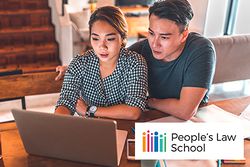Being an Executor: Difference between revisions
Jump to navigation
Jump to search
No edit summary |
No edit summary |
||
| Line 18: | Line 18: | ||
*'''[[Probate Checklist for Being an Executor|Probate Checklist]] | *'''[[Probate Checklist for Being an Executor|Probate Checklist]] | ||
*'''[[Where to | *'''[[Where to Get Help for Being an Executor| Where to Get Help]]''' | ||
*'''[[Glossary for Being an Executor| Glossary]]''' | *'''[[Glossary for Being an Executor| Glossary]]''' | ||
Revision as of 21:44, 22 July 2015

|
|
This is a Clicklaw Wikibook, a collaborative, plain language legal publication that is updated as a wiki and can be printed or downloaded. |
|
|
Download the full Wikibook in PDF. |
|
|
Customize: take what you need, leave the rest (learn more). |
Being an Executor from People's Law School is about putting your affairs in order and planning for the future. Inside you will find information about being an executor, what to do when someone has asked you to be their executor and where you can find help. This edition reflects changes to the Wills, Estates and Succession Act (2014).
Contents[edit]
About this Wikibook[edit]
- About Being an Executor
- Learn more about Clicklaw Wikibooks or visit other wikibooks from People's Law School
About People's Law School[edit]
The People's Law School is a non-profit charitable society whose purpose is to provide British Columbians with reliable information about their rights and responsibilities under the law.

- Suite 150 - 900 Howe Street
- Vancouver, BC V6Z 2M4
- Telephone: 604-331-5400
- Email: info@publiclegaled.bc.ca
- Website: www.publiclegaled.bc.ca